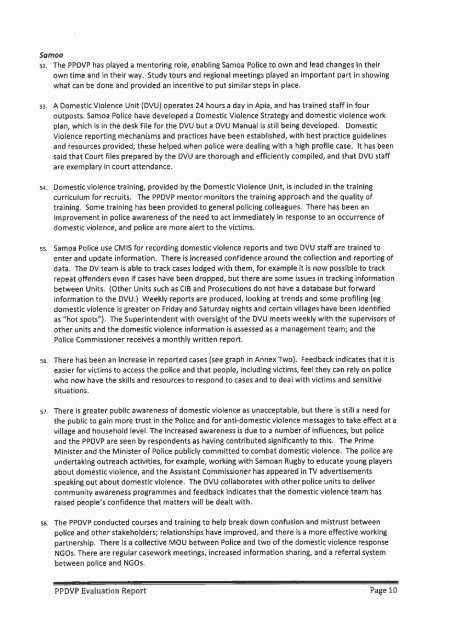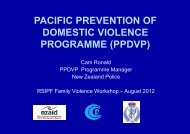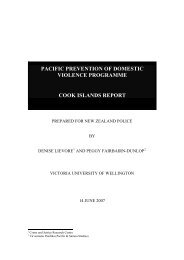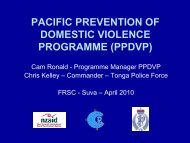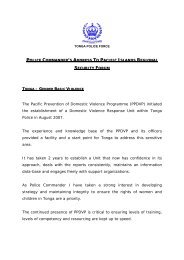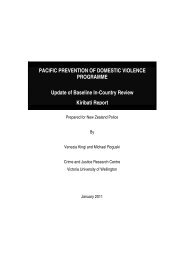PPDVP Evaluation Report - Pacific Prevention of Domestic Violence ...
PPDVP Evaluation Report - Pacific Prevention of Domestic Violence ...
PPDVP Evaluation Report - Pacific Prevention of Domestic Violence ...
You also want an ePaper? Increase the reach of your titles
YUMPU automatically turns print PDFs into web optimized ePapers that Google loves.
Samoa52. The <strong>PPDVP</strong> has played a mentoring role, enabling Samoa Police to own and lead changes in theirown time and in their way. Study tours and regional meetings played an important part in showingwhat can be done and provided an incentive to put similar steps in place.53. A <strong>Domestic</strong> <strong>Violence</strong> Unit (DVU) operates 24 hours a day in Apia, and has trained staff in fouroutposts. Samoa Police have developed a <strong>Domestic</strong> <strong>Violence</strong> Strategy and domestic violence workplan, which is in the desk File for the DVU but a DVU Manual is still being developed. <strong>Domestic</strong><strong>Violence</strong> reporting mechanisms and practices have been established, with best practice guidelinesand resources provided; these helped when police were deating with a high pr<strong>of</strong>ile case. It has beensaid that Court files prepared by the DVU are thorough and efficiently compiled, and that DVU staffate exemplary in court attendance.54. <strong>Domestic</strong> violence training, provided by the <strong>Domestic</strong> <strong>Violence</strong> Unit, is included in the trainingcurriculum for recruits. The <strong>PPDVP</strong> mentor monitors the training approach and the quality <strong>of</strong>training. Some training has been provided to general policing colleagues. There has been animprovement in police awareness <strong>of</strong> the need to act immediately in response to an occurrence <strong>of</strong>domestic violence, and police are more alert to the victims.ss.Samoa Police use CMlS for recording domestic violence reports and two DVU staff are trained toenter and update information. There is increased confidence around the collection and reporting <strong>of</strong>data. The DV team is able to track cases lodged with them, for example it is now possible to trackrepeat <strong>of</strong>fenders even if cases have been dropped, but there are some issues in tracking informationbetween Units. (Other Units such as CIB and Prosecutions do not have a database but forwardinformation to the DVU.) Weekly reports are produced, looking at trends and some pr<strong>of</strong>iling (egdomestic violence is greater on Friday and Saturday nights and certain villages have been identifiedas "hot spots"). The Superintendent with oversight <strong>of</strong> the DVU meets weekly with the supervisors <strong>of</strong>other units and the domestic violence information is assessed as a management team; and thePolice Commissioner receives a monthly written report.56. There has been an increase in reported cases (see graph in Annex Two). Feedback indicates that it iseasier for victims to access the police and that people, including victims, feel they can rely on policewho now have the skills and resources to respond to cases and to deal with victims and sensitivesituations.57. There is greater public awareness <strong>of</strong> domestic violence as unacceptable, but there is still a need forthe public to gain more trust in the Police and for anti-domestic violence messages to take effect at avillage and household level. The increased awareness is due to a number <strong>of</strong> influences, but policeand the <strong>PPDVP</strong> are seen by respondents as having contributed significantly to this. The PrimeMinister and the Minister <strong>of</strong> Police publicly committed to combat domestic violence. The police areundertaking outreach activities, for example, working with Samoan Rugby to educate young playersabout domestic violence, and the Assistant Commissioner has appeared in TV advertisementsspeaking out about domestic violence. The DVU collaborates with other police units to delivercommunity awareness programmes and feedback indicates that the domestic violence team hasraised people's confidence that matters will be dealt with.se.The <strong>PPDVP</strong> conducted courses and training to help break down confusion and mistrust betweenpolice and other stakeholders; relationships have improved, and there is a more effective workingpartnership. There is a collective MOU between Police and two <strong>of</strong> the domestic violence responseNGOs. There are regular casework meetings, increased information sharing, and a referral systembetween police and NGOs.<strong>PPDVP</strong> <strong>Evaluation</strong> <strong>Report</strong> Page 10


